Writing a persuasive argument
Common Core Standards: Grade 4 Reading: Informational Text , Grade 4 Writing , Grade 4 Language
CCSS.ELA-Literacy.RI.4.2, CCSS.ELA-Literacy.RI.4.8, CCSS.ELA-Literacy.RI.4.10, CCSS.ELA-Literacy.W.4.2, CCSS.ELA-Literacy.L.4.5
This worksheet originally published in English Made Easy Key Stage 2 for ages 9 to 10 by © Dorling Kindersley Limited .
Yes! Sign me up for updates relevant to my child's grade.
Please enter a valid email address
Thank you for signing up!
Server Issue: Please try again later. Sorry for the inconvenience
- Grades 6-12
- School Leaders
Don't Miss Today's Holiday Giveaway!🎁

100 Thought-Provoking Argumentative Writing Prompts for Kids and Teens
Practice making well-reasoned arguments using research and facts.
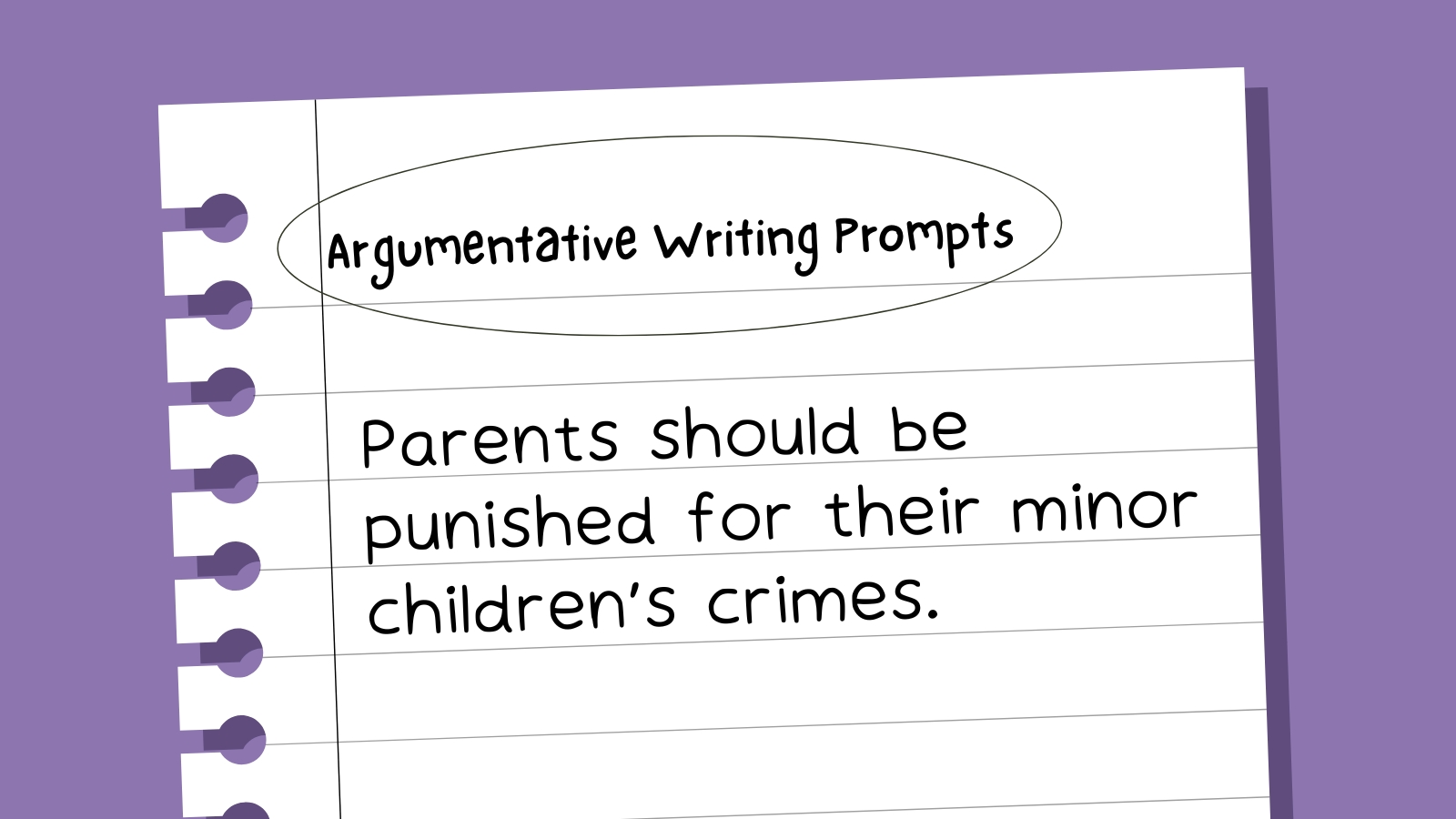
Writing a strong argumentative essay teaches students to make a case for their own point of view without relying on emotion or passion. These argumentative essay topics provide options for kids of all ages, including controversial subjects and some that are just for fun.
School and Education Argumentative Essay Topics
Science and history argumentative essay topics, life and ethics argumentative essay topics, social justice and civics argumentative essay topics, more argumentative essay topics.
Plus, make sure to fill out the form on this page to grab your free printable argumentative essay graphic organizers to help your students plan their essays.
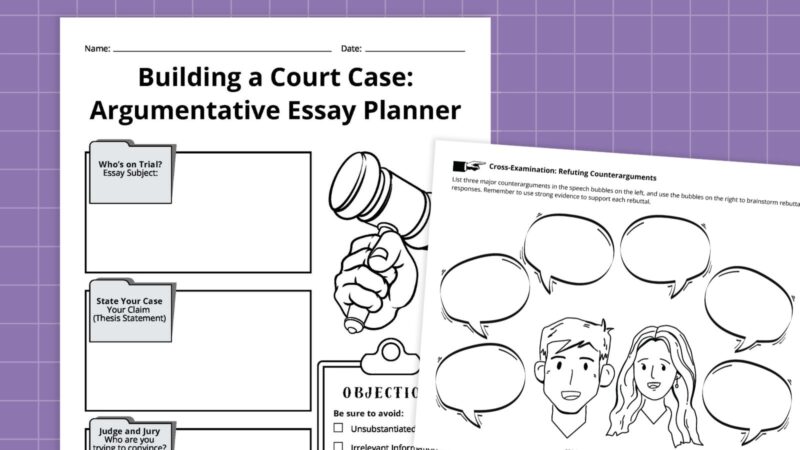
What is an argumentative essay?
In an argumentative essay, the author considers multiple points of view and argues in favor of one claim. It’s a lot like building a court case. Start with an opening statement that explains your claim and the reasons that support it. Then, use strong evidence to support each of those reasons, and to refute any counterarguments (opposing points of view). Finish with a compelling conclusion that sums up and reinforces your claim.
What’s the difference between argumentative and persuasive essays?
These two types of essays are similar, but there are some subtle and important differences .
- Author’s purpose: In an argumentative essay, your job is to simply convince the reader that the point of view you’re presenting is valid, even if it doesn’t change their mind. Persuasive essays seek to sway the reader to adopt your point of view over any others.
- Method: Argumentative essays rely heavily on well-researched facts and logical assertions. In a persuasive essay, the writer may use a blend of emotion and facts to win over the reader.
- Audience: Persuasive essays require a specific audience, since the writer must acknowledge and attempt to overcome their potential objections. The writer of an argumentative essay is simply making a statement, so knowing their audience is less important.
- Viewpoint: A persuasive essay writer should believe their point of view is the only correct one, and try to persuade the reader to agree. Argumentative essays acknowledge other points of view, but use reason and logic to argue that the writer’s point of view is best.
Persuasive and argumentative essay topics often overlap. The difference is in how the writer approaches the topic. When you assign one of the topics below as an argumentative essay, remind students to use research, reason, and logic to make a strong but dispassionate argument.

- Should physical education be part of the standard high school curriculum?
- Schools should require recommended vaccines for all students, with very limited exceptions.
- Should all students have the ability to attend college for free?
- What one class should all high schools students be required to take and pass in order to graduate?
- Do you think homework should be required, optional, or not given at all?
- Students should/should not be able to use their phones during the school day.
- Should schools have dress codes?
- What is the most important school subject?
- Are letter grades helpful, or should we replace them with something else?
- If I could change one school rule, it would be …
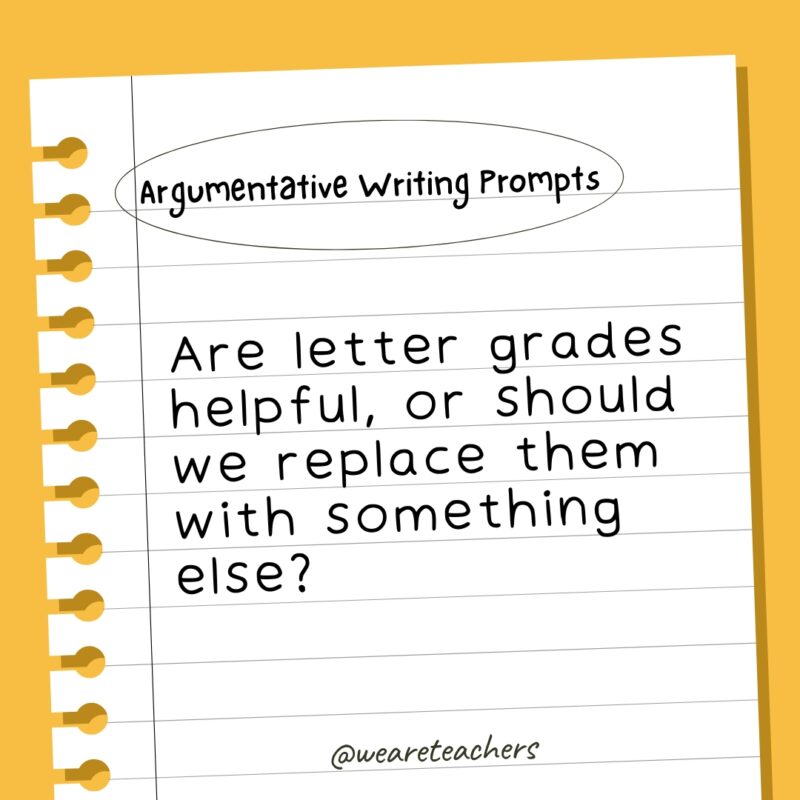
- Is year-round school a good idea?
- Which is better, private schools or public schools?
- Should every student have to participate in athletics?
- Do you think schools should ban junk food from their cafeterias?
- Should students be required to volunteer in their communities?
- Should schools be allowed to ban some books from their libraries?
- Which is better, book smarts or street smarts?
- Are single-gender schools better or worse for students?
- Are computers making teachers obsolete?
- Students who fail a test should be given a chance to take it again.

- Is it acceptable to use animals for experiments and research?
- Vaping is less harmful than smoking tobacco.
- Do we really learn anything from history, or does it just repeat itself over and over?
- Is it OK to keep animals in zoos?
- Should we ban plastic bags and bottles?
- Should we still consider Pluto a planet?
- It’s important to spend tax dollars exploring space instead of on other things.
- Is there life on other planets?
- Who was the best/worst American president?
- Should vaccines be mandatory?
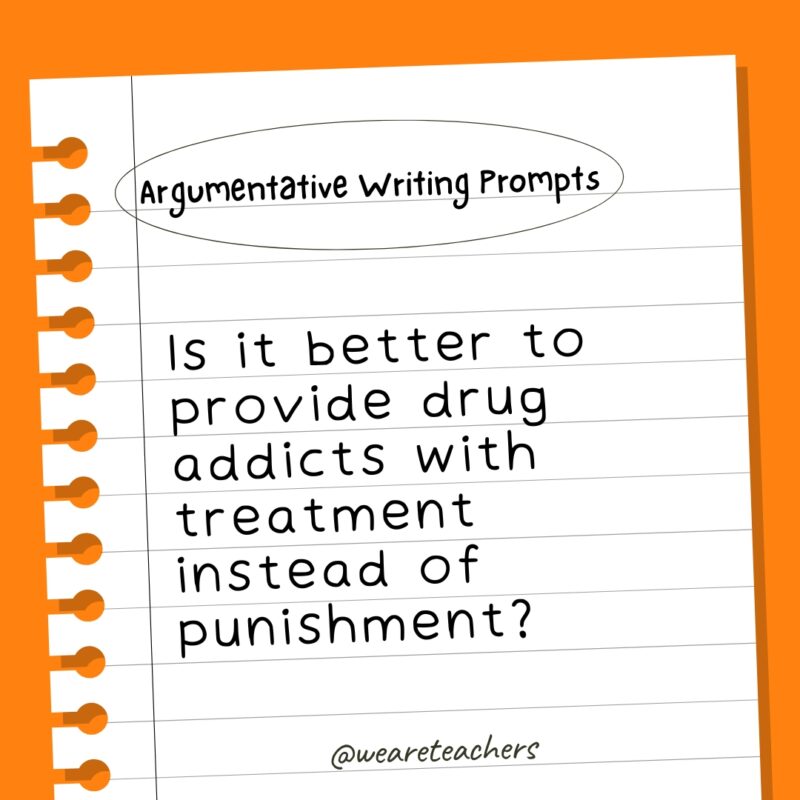
- Are GMOs more helpful than harmful?
- Is animal cloning ethical?
- Should human cloning be legal?
- Should we use stem cells from human embryos for scientific research?
- Is it better to provide drug addicts with treatment instead of punishment?
- Should we ban the use of fossil fuels?
- Can we truly do anything about human-caused global warming?
- Are electric vehicles better than gas-powered ones?
- Was life really better “back in the day”?
- Choose a foreign conflict (e.g., Vietnam or Afghanistan) and argue whether or not the United States was justified in getting involved.
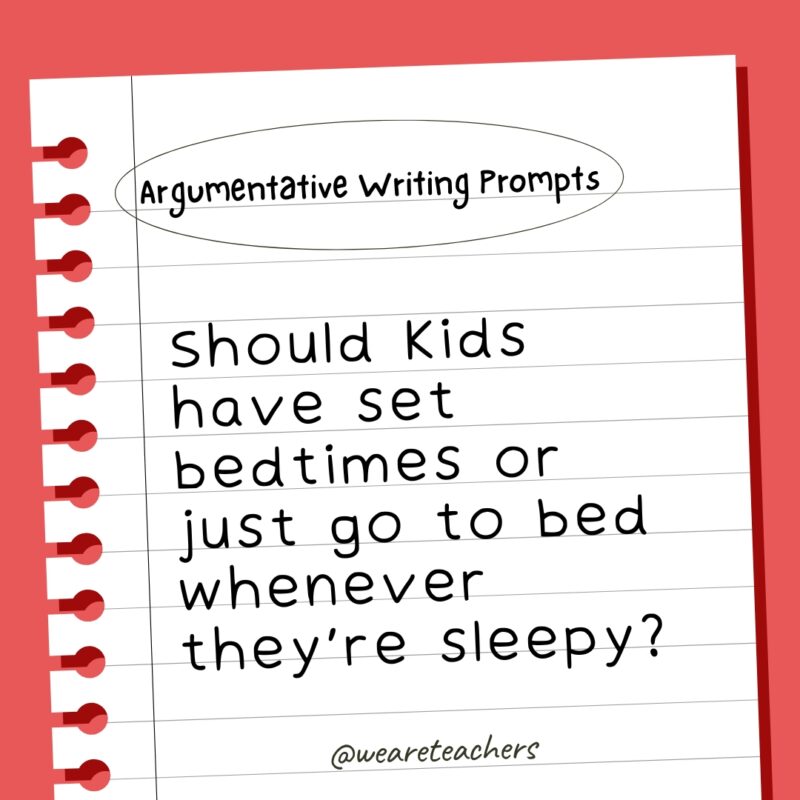
- The most important challenge our country is currently facing is … (e.g., immigration, gun control, economy)
- Does social media do more harm than good?
- The best country in the world is …
- Are men and women treated equally?
- Is it better to be vegetarian/vegan or to eat meat?
- Should little kids be allowed to play competitive sports?
- Who faces more peer pressure, girls or boys?
- Should kids have set bedtimes or just go to bed whenever they’re sleepy?
- Which is better, artificial Christmas trees or real ones?
- Playing violent video games is bad for kids and teens.
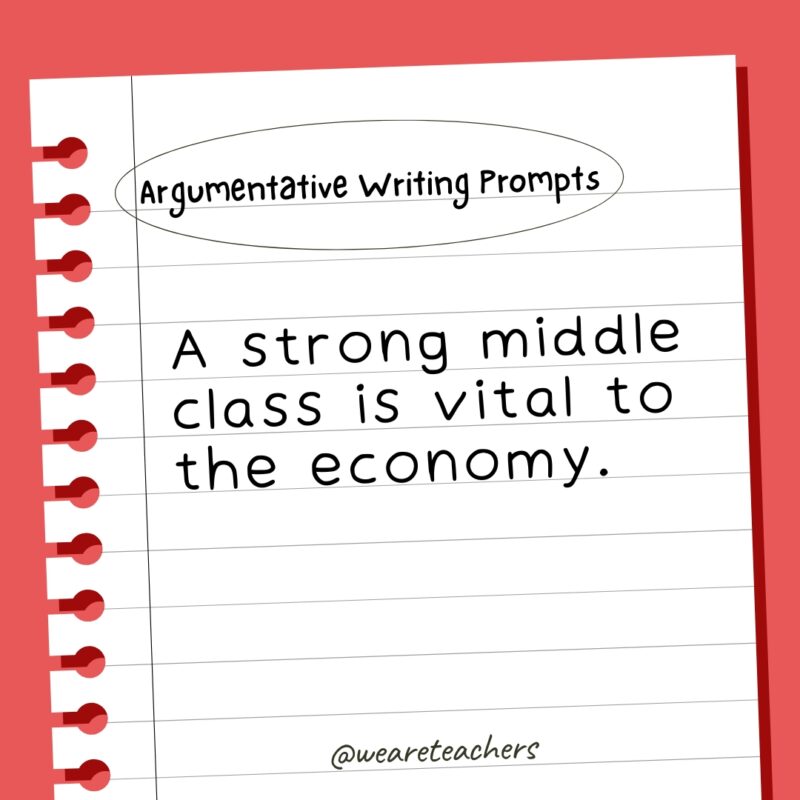
- Parents should track their kids’ cell phone use.
- Are paper books better than e-books?
- All kids should play on the same sports teams, regardless of gender.
- All paper documents should be replaced with electronic versions.
- Is conflict necessary for change?
- Is war ever justified?
- A strong middle class is vital to the economy.
- Is the local minimum wage truly a living wage?
- Should we do away with gender-specific public bathrooms?
- Is a progressive income tax better than a flat tax?
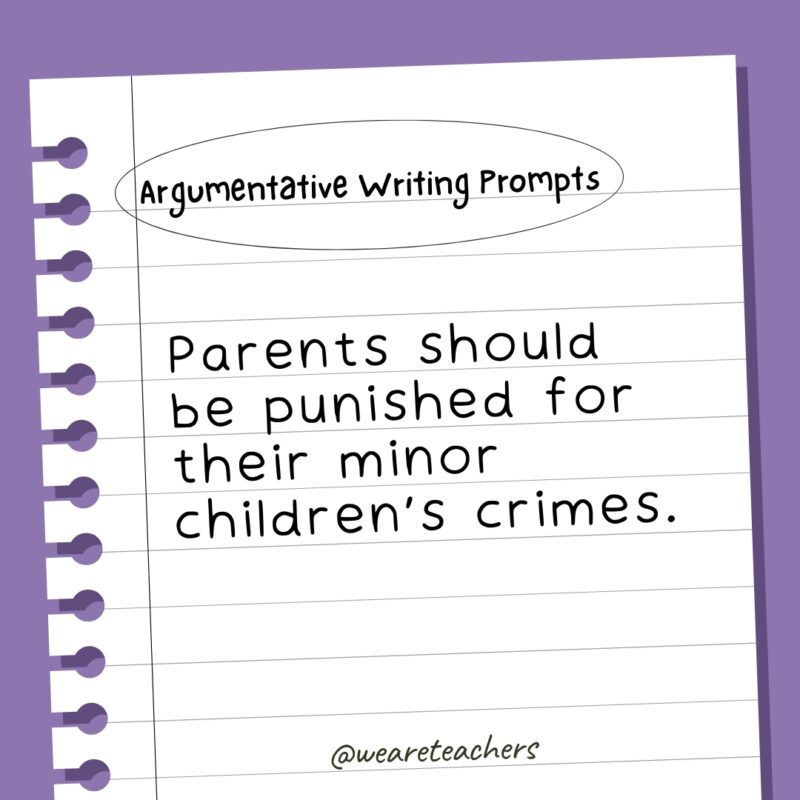
- Capital punishment does/does not deter crime.
- Would it be better to legalize, tax, and regulate all drugs (including alcohol and cigarettes) instead of banning them?
- Parents should be punished for their minor children’s crimes.
- The government should provide free internet access for every citizen.
- Is democracy the best form of government?
- Is capitalism the best form of economy?
- Should all Americans be required to vote?
- Should we change the minimum driving age in the United States?
- Do you think the government should find a way to provide free healthcare for everyone?
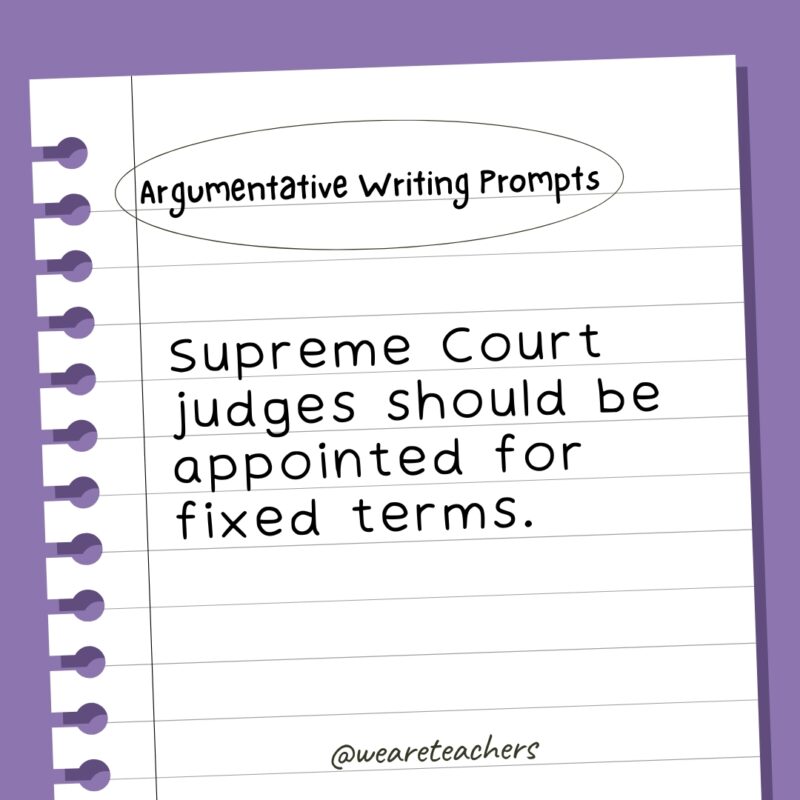
- School-age children should be allowed to vote.
- We should/should not abolish the Electoral College.
- Are “stand your ground” laws effective?
- Supreme Court judges should be appointed for fixed terms.
- Does segregation still exist in the United States?
- We should/should not continue building a wall between the United States and Mexico.
- Will stricter gun control laws help control mass shootings?
- Should we make the path to American citizenship easier?
- Is the American justice system inherently racist?
- Should we redirect some or all police force funding to social services?
- Should the United States implement a universal basic income?
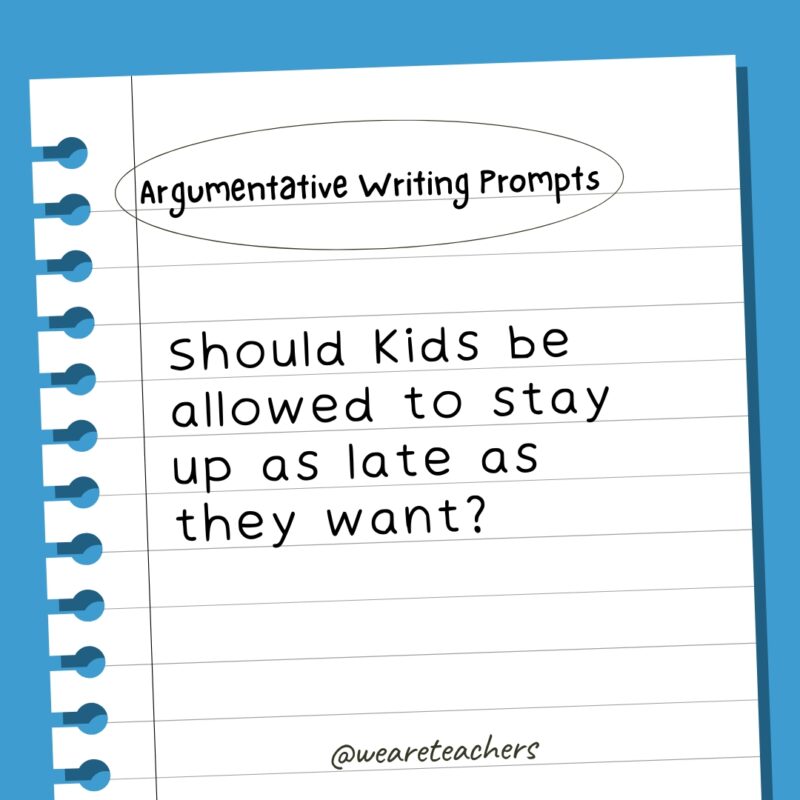
- Choose a fictional character and explain why they should be the next president.
- What animal makes the best pet?
- Who is the world’s best athlete, present or past?
- Which is better, reading books or watching TV?
- Is a taco a sandwich?
- Should kids be allowed to stay up as late as they want?
- What’s the best video game system?
- Kids shouldn’t have to go to school on their birthdays.
- Is video gaming a sport?
- Are beauty pageants sexist?
- Should kids get participation trophies for sports?
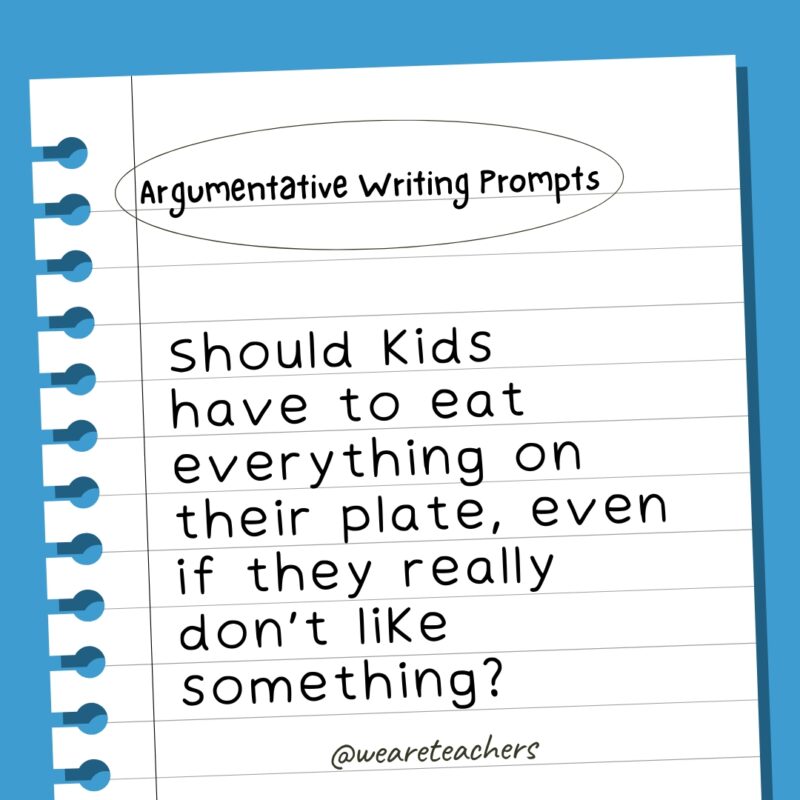
- Are stereotypes ever right?
- Is there any benefit to teaching proper grammar and spelling, or should we allow language to be descriptive instead of prescriptive?
- All teenagers should have part-time jobs.
- Should kids have limits on screen time?
- Is it better to read fiction or nonfiction?
- Should kids have to eat everything on their plate, even if they really don’t like something?
- Is it better to spend an hour a day reading or exercising?
- Is graffiti an act of vandalism or an art form?
- Should society hold celebrities to a high moral standard?
Get your free printable argumentative writing graphic organizers
Our free printable argumentative essay graphic organizers use a court case theme to help student plan their essays. There are worksheets covering opening statements, reasoning and supporting evidence, refuting counter arguments, and closing statements. Just click the button below to fill out the form and receive your copy of this free worksheet bundle.
What are your favorite argumentative writing prompts? Come share your thoughts in the We Are Teachers HELPLINE group on Facebook .
Also check out intriguing cause & effect essay topics for students ., you might also like.

The Big List of Essay Topics for High School (150+ Ideas!)
Ideas to inspire every young writer. Continue Reading
Copyright © 2024. All rights reserved. 5335 Gate Parkway, Jacksonville, FL 32256
Jump to navigation
- Inside Writing
- Teacher's Guides
Student Models
- Writing Topics
- Minilessons
- Shopping Cart
- Inside Grammar
- Grammar Adventures
- CCSS Correlations
- Infographics
Student Writing Models
How do I use student models in my classroom?

When you need an example written by a student, check out our vast collection of free student models. Scroll through the list, or search for a mode of writing such as “explanatory” or “persuasive.”
Jump to . . .
Explanatory writing.
- How Much I Know About Space Explanatory Paragraph
- My Favorite Pet Explanatory Paragraph
- Sweet Spring Explanatory Paragraph
Narrative Writing
- A Happy Day Narrative Paragraph
- My Trip to Mexico Narrative Paragraph
Creative Writing
- Happy Easter Story Paragraph
- Leaf Person Story
Research Writing
- Parrots Report
- If I Were President Explanatory Paragraph
- My Dad Personal Narrative
- The Horrible Day Personal Narrative
Response to Literature
- One Great Book Book Review
- A Fable Story
- Ant Poem Poem
- The Missing Coin Story
- Winter Words Poem
- Horses Report
- Ladybugs Report
- How to Make Boiled Eggs How-To
Persuasive Writing
- Plastic, Paper, or Cloth? Persuasive Paragraph
- The Funny Dance Personal Narrative
- The Sled Run Personal Narrative
- Hello, Spring! Poem
- Cheetahs Report

Business Writing
- Dear Ms. Nathan Email
- My Favorite Place to Go Description
- My Mother Personal Essay
- Rules Personal Essay
- Shadow Fort Description
- Adopting a Pet from the Pound Editorial
- Letter to the Editor Letter to the Editor
- Ann Personal Narrative
- Grandpa, Chaz, and Me Personal Narrative
- Indy’s Life Story Personal Narrative
- Jet Bikes Personal Narrative
- The Day I Took the Spotlight Personal Narrative
- A Story of Survival Book Review
- Chloe’s Day Story
- Did You Ever Look At . . . Poem
- Dreams Poem
- I Am Attean Poem
- Sloppy Joes Poem
- The Civil War Poem
- The Haunted House Story
- The Terror of Kansas Story
- When I Was Upside Down Poem
- Deer Don’t Need to Flee to Stay Trouble-Free! Report
- Height-Challenged German Shepherd Report
- Friendship Definition
- What Really Matters News Feature
- Cheating in America Problem-Solution
- Hang Up and Drive Editorial
- Musical Arts Editorial
- Summer: 15 Days or 2 1/2 Months? Editorial
- A Cowboy's Journal Fictionalized Journal Entry
- Giving Life Personal Narrative
- The Great Paw Paw Personal Narrative
- The Racist Warehouse Personal Narrative
- Limadastrin Poem
- The Best Little Girl in the World Book Review
- How the Stars Came to Be Story
- Linden’s Library Story
- My Backyard Poem
- The Call Poem
- I Am Latvia Research Report
- Mir Pushed the Frontier of Space Research Report
- The Aloha State Research Report
- The Incredible Egg Observation Report
- Unique Wolves Research Report
- Dear Dr. Larson Email
Personal Writing
- A Lesson to Learn Journal
- Caught in the Net Definition
- From Bed Bound to Breaking Boards News Feature
- If Only They Knew Comparison-Contrast
- Save the Elephants Cause-Effect
- Student Entrepreneur Reaches for Dreams of the Sky News Feature
- Internet Plagiarism Problem-Solution
- Mosquito Madness Pet Peeve
- Anticipating the Dream Personal Narrative
- Huddling Together Personal Narrative
- H’s Hickory Chips Personal Narrative
- It’s a Boy! Personal Narrative
- My Greatest Instrument Personal Narrative
- Snapshots Personal Narrative
- Take Me to Casablanca Personal Narrative
- The Boy with Chris Pine Blue Eyes Personal Narrative
- The Climb Personal Narrative
- The House on Medford Avenue Personal Narrative
- Adam’s Train of Ghosts Music Review
- Diary of Gaspard Fictionalized Journal Entry
- My Interpretation of The Joy Luck Club Literary Analysis
- Mama’s Stitches Poem
- The KHS Press Play
- Rosa Parks Research Report
- The Killer Bean Research Report
- Mid-Project Report on History Paper Email
- Vegetarian Lunch Options at Bay High Email

Teaching with a Five-Paragraph Essay Example
Looking for a five-paragraph essay example? Look and listen in as a fourth grade teacher models this strong writing structure for her students.
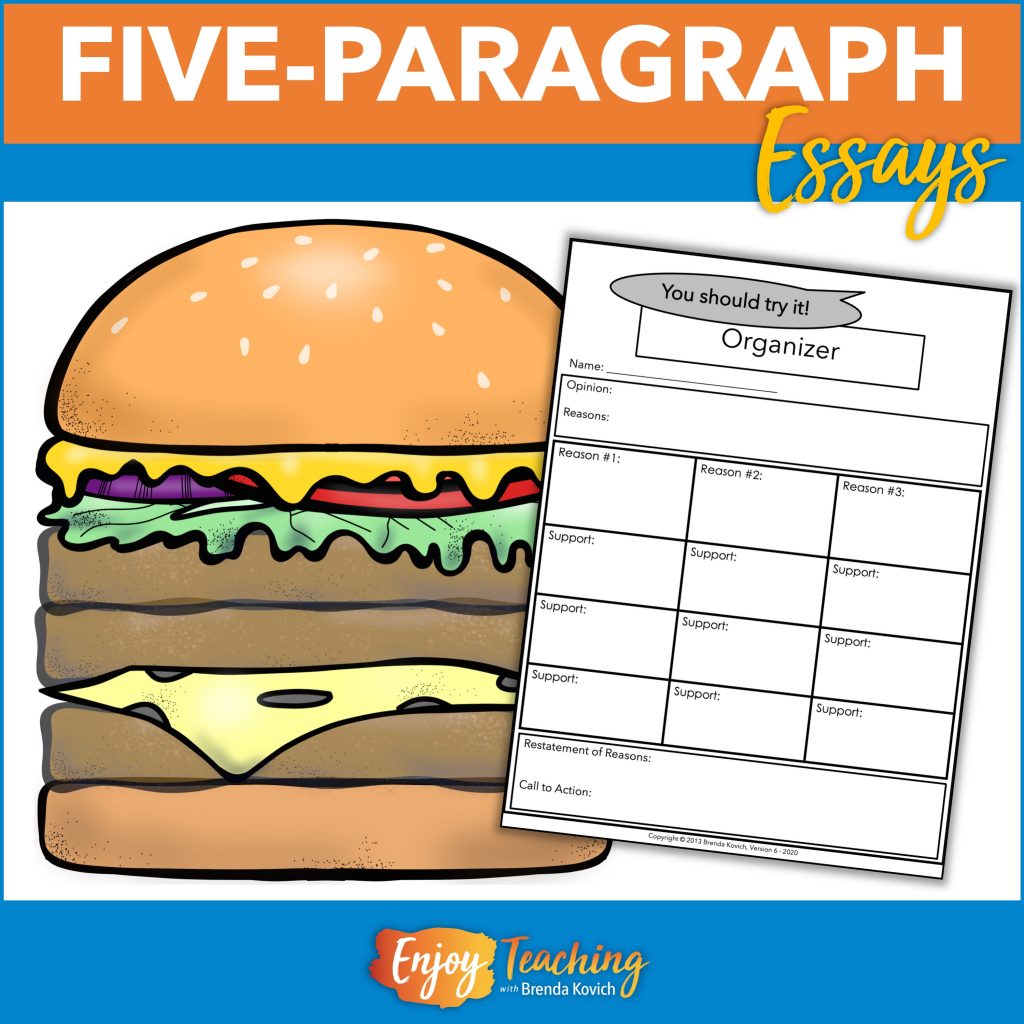
Ms. Sneed Grades Her Kids’ Paragraphs
As our favorite fourth grade teacher graded her class’s latest paragraphs, she let out a satisfied sigh. First they tackled paragraph structure. Then they learned to elaborate. Additionally, they improved their writing by varying sentences and using transitions. Now that they had the writing strategies down, her kids were ready to scaffold from one paragraph to the five-paragraph essay .
Purposefully tackling each genre of writing – then scaffolding from shorter to longer – was sure to work for her.
A Five-Paragraph Essay Example
Ms. Sneed turned and opened her laptop. With just a few clicks, she found it. Her favorite prompt, You Should Try It , asked kids to persuade others to try an activity – in five paragraphs.
Teaching Paragraph by Paragraph
The following Monday, Ms. Sneed stood in front of her class. “Today,” she said, “you will learn how to write a longer essay.”
Several kids looked a little unsure, but their teacher continued. “For now, I’ll take you through a five-paragraph essay example. That should ease your concerns.”
First Paragraph
Ms. Sneed projected a sample. “The first paragraph, or introduction, includes a thesis statement and supportive factual reasons.”
With the mention of a new term, thesis statement , more kids looked uncomfortable. Some squirmed in their seats.
“Now I know the term thesis statement is new, but no worries! You know it as a topic sentence. However, the thesis is the main idea of a multi-paragraph composition.”
The teacher read the paragraph aloud. “Can anyone pick out the thesis for this persuasive essay?” she asked.
One student slowly raised his hand. “Wouldn’t you like to try water skiing?”
“Yes! Although it’s written as a question, this sentence offers an opinion. Furthermore, the entire essay supports this thesis. Can you find the author’s three supporting reasons?”
Using the five-paragraph essay example, the class soon established the supporting details too: improving health, impressing friends, and teaching them to ski.
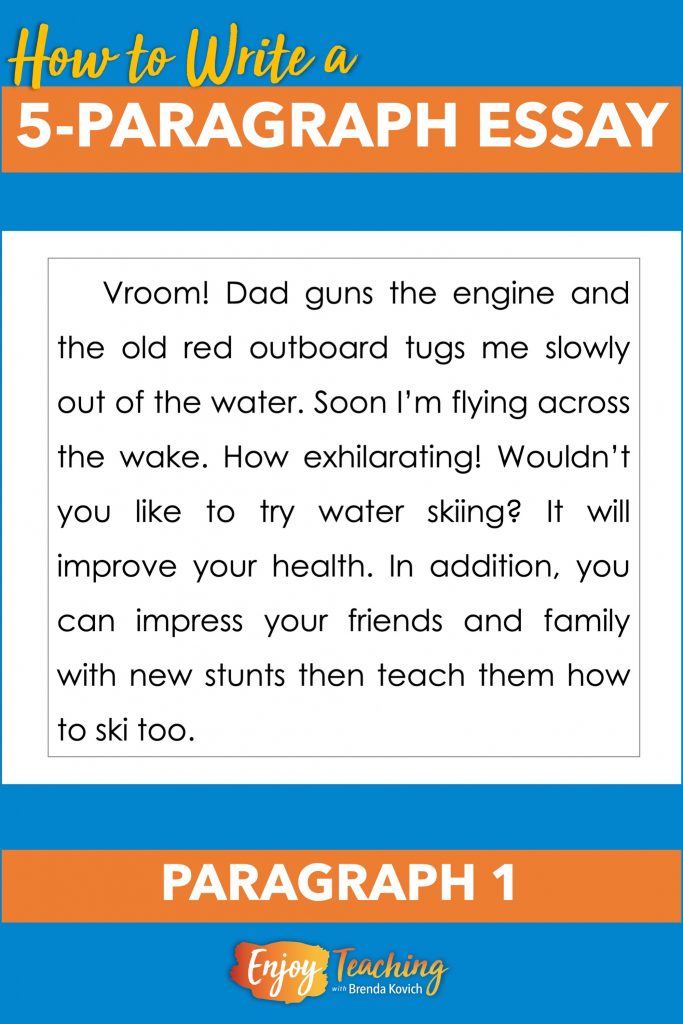
Second Paragraph
“Now let’s look at the second paragraph,” Ms. Sneed said.

“You identified one of the main details as health. As you can see, this paragraph expands on that reason.”
“That’s just what we were doing with one paragraph,” piped up a girl in the back row.
“Um-hm. True. But writing in five paragraphs gives you more room to elaborate.”
The kids seemed to relax in their seats. This wasn’t so bad after all.
Third Paragraph
With no further ado, she pulled up the third paragraph. “See, paragraph #3 discusses the second main supportive detail.”
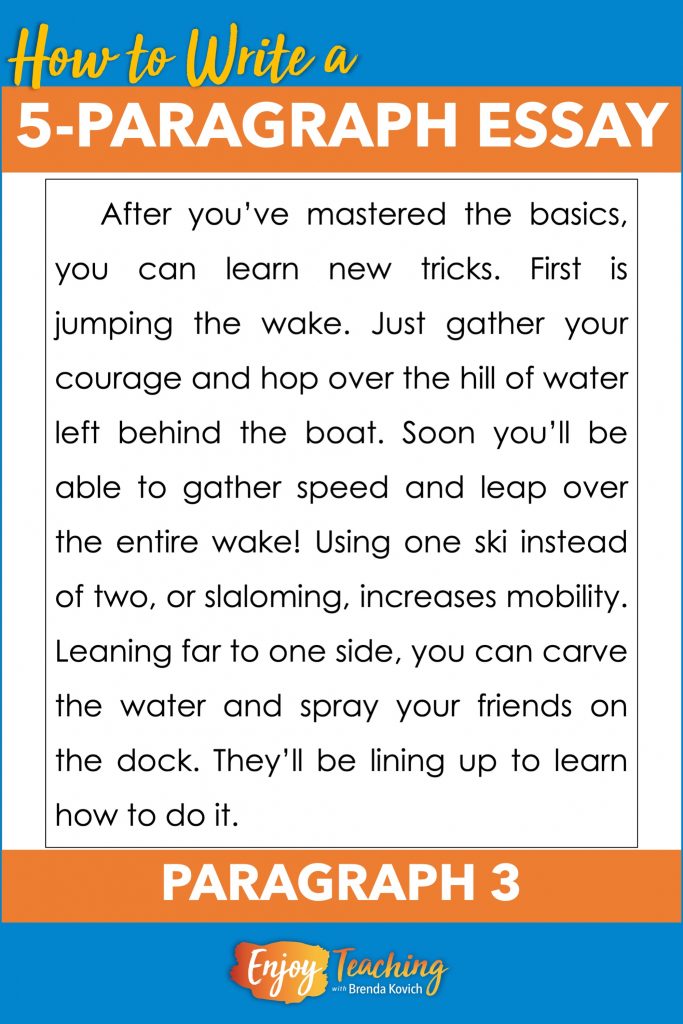
After they read the paragraph aloud, Ms. Sneed asked, “Who can find the topic sentence of this paragraph?”
“Isn’t it the first sentence?” said a boy with purple glasses.
Ms. Sneed nodded. “Easy peasy. The main idea of this paragraph, as we said before, is the second reason.”
Fourth Paragraph
For the fourth paragraph, Ms. Sneed tried a new tactic. “Okay, think-pair-share! Find the the topic sentences and smaller details that support it.” Her students knew what this meant. Immediately, they turned to their seat partners and began to discuss.
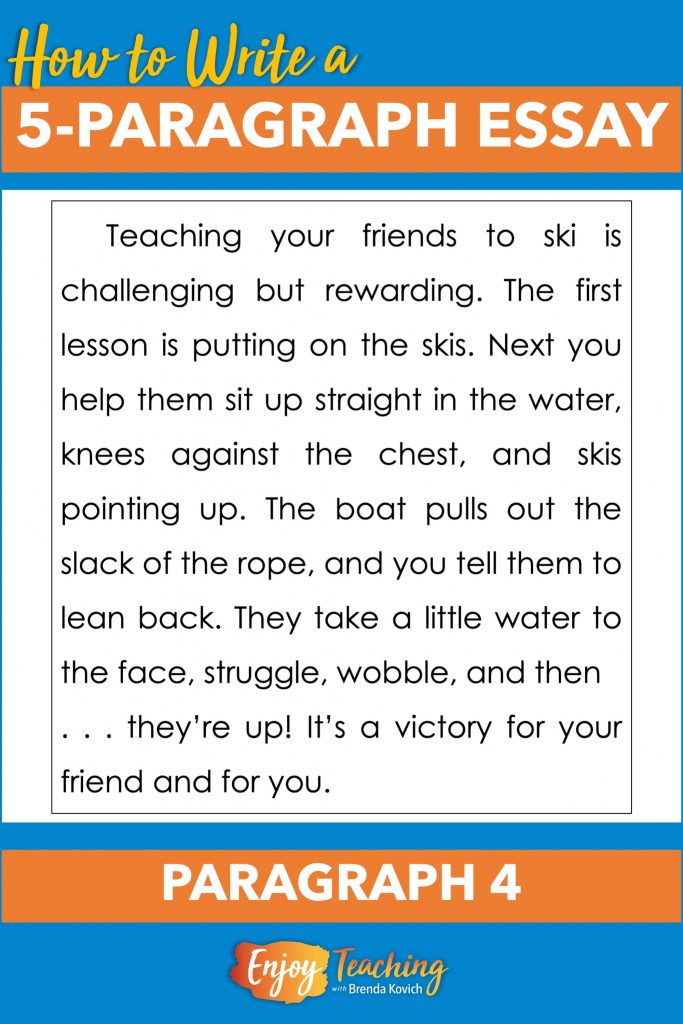
After a few minutes, groups began to share:
“The first sentence is the topic sentence again,” said the first spokesperson.
“And the details are the steps in teaching,” said the second.
“Ahh, a sequence paragraph inside a five-paragraph persuasive essay,” Ms. Sneed remarked. That famous teacher smile spread across her face.
Fifth Paragraph
“Here we have the final paragraph, or conclusion,” the teacher continued.
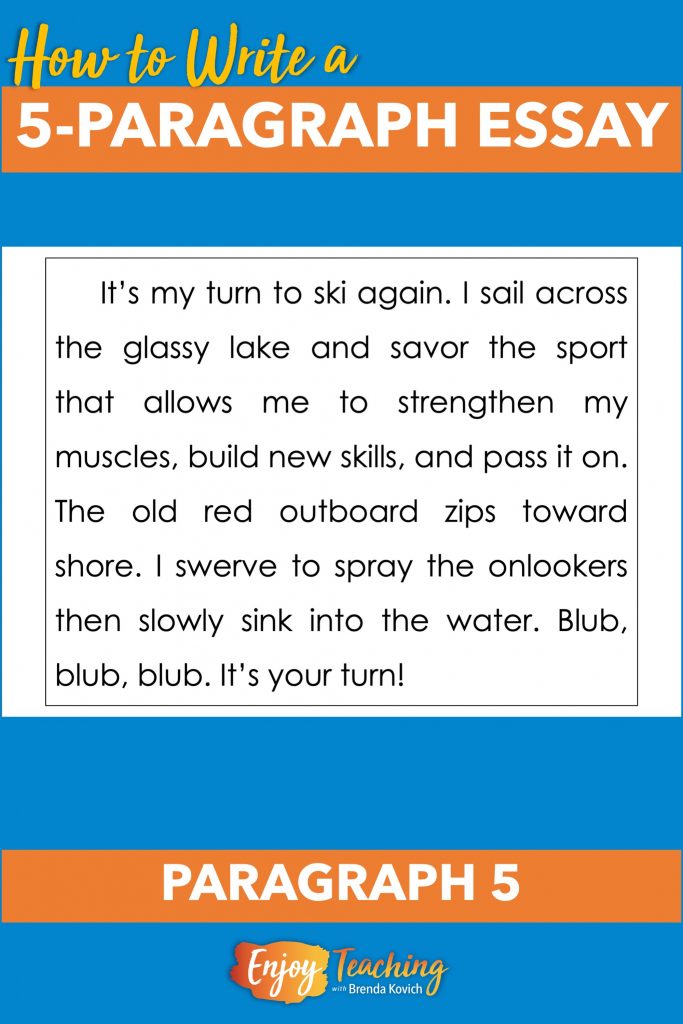
After she read the paragraph aloud, Ms. Sneed pointed out the restated thesis statement and details. “It’s a repeat of the first paragraph in different words.”
A Five-Paragraph Essay Example – and a Hamburger!
Quickly, strode toward the board. She picked up a marker and sketched a hamburger with three patties. “Does this look familiar?”
Everyone smiled and nodded. Ms. Sneed’s favorite analogy for an writing a paragraph !
“We just used this again,” their teacher said. “The top bun is the first paragraph. It introduces the main idea with a thesis statement and supporting details. The first hamburger patty explores the first detail; the second, the second; and the third, the third! Finally, the bottom bun wraps it all up with a restatement of the thesis and details. This helps you write, as well as find the main idea and supporting details .”
“It’s just a giant version of the paragraph,” said a small girl in the front corner.
“Yep,” replied Ms. Sneed. “Not hard at all – if you know what you’re doing. Over the next few months, we’ll write more of these essays in our ELA block . Then you’ll feel even more confident.”

Free Printable Argument Writing Worksheets for 4th Grade
Argument Writing: Discover a collection of free printable Reading & Writing worksheets for Grade 4 students, designed to enhance their critical thinking and persuasive skills. Empower your students with Quizizz's curated resources.

Explorar Argument Writing hojas de trabajo por grados
- kindergarten
Explore otras hojas de trabajo de materias para grade 4
- Social studies
- Social emotional
- Foreign language
- Reading & Writing
Explore printable Argument Writing worksheets for 4th Grade
Argument Writing worksheets for Grade 4 are an essential tool for teachers looking to enhance their students' reading and writing skills. These worksheets focus on developing the ability to construct well-structured arguments, a vital aspect of nonfiction writing. By incorporating these worksheets into their lesson plans, teachers can provide students with opportunities to practice their persuasive writing techniques, while also improving their overall reading comprehension. As students progress through the grade levels, the complexity of the topics and the depth of the arguments they are expected to produce will increase, making these worksheets an invaluable resource for building a strong foundation in reading and writing for Grade 4 students. In addition to argument writing, these worksheets also cover other essential elements of nonfiction writing, such as summarizing information, identifying main ideas, and supporting details. Argument Writing worksheets for Grade 4 are a must-have for any teacher looking to improve their students' reading and writing abilities.
Quizizz is an innovative platform that offers a wide range of educational resources, including Argument Writing worksheets for Grade 4, to help teachers create engaging and interactive learning experiences for their students. By incorporating Quizizz into their lesson plans, teachers can access a vast library of reading and writing materials, as well as quizzes, games, and other interactive activities designed to reinforce key concepts and skills. This platform is particularly useful for teachers who are looking to supplement their existing curriculum with additional resources that target specific areas of reading and writing, such as nonfiction writing. With Quizizz, teachers can easily track their students' progress and identify areas where they may need additional support or practice. By combining the power of Argument Writing worksheets for Grade 4 with the interactive features of Quizizz, teachers can create a dynamic and effective learning environment that fosters growth and improvement in reading and writing skills for their students.

IMAGES
VIDEO
COMMENTS
Page 4 (Opinion/Argument—Opinion Essay)SAMPLE B4-8 MORE COMMENTARY. STANDARDS-BASED COMMENTARY Opinion/Argument can get exercise and fresh air. The last reason why kids should ... Page 6 (Opinion/Argument—Opinion Essay)SAMPLE B4-8 Writing. Grade 4, Standard 1: (continued) W.4.1.c Link opinion and reasons using words and
In this series of writing worksheets, your child will read an example of a persuasive argument and then answer questions about the text's structure, meaning, and language. Your child will also get practice summarizing the writer's main points. Bonus: your child may use a dictionary and/or a thesaurus for help finding word replacements.
Body paragraph #4: Writing the opposing argument. 1) The opposing argument, called the counterclaim or counterargument, proves that you fully understand the topic and that you have considered the opposition. 2) The turn-back is a return to the original argument. It gives you an opportunity to prove why the opposing argument is invalid.
Browse Printable 4th Grade Argument Writing Worksheets. Award winning educational materials designed to help kids succeed. Start for free now!
All Grades K-5 All Grades 6-12 PreK 6th Grade Kindergarten 7th Grade 1st Grade 8th Grade 2nd Grade 9th Grade 3rd Grade 10th Grade 4th Grade 11th Grade 5th Grade 12th Grade. ... Argumentative essays acknowledge other points of view, but use reason and logic to argue that the writer's point of view is best.
Brainstorming will help you get started with your argumentative essay. In this section, you will choose a topic for your essay, write your thesis statement, think about several supporting ideas for your opinion, and think about the counterargument. Planning your Essay Follow the steps below to develop ideas for an argument essay. 1.
Student Models. When you need an example written by a student, check out our vast collection of free student models. Scroll through the list, or search for a mode of writing such as "explanatory" or "persuasive."
Grade 4, Prompt for Opinion Writing . Common Core Standard W.CCR.1 (Directions should be read aloud and clarified by the teacher.) Name: Before you begin: On a piece of lined paper, write your name and grade, the date, the name of your school and your state, and your teacher's name. You will use this paper for writing. The Best Pet
The following Monday, Ms. Sneed stood in front of her class. "Today," she said, "you will learn how to write a longer essay." Several kids looked a little unsure, but their teacher continued. "For now, I'll take you through a five-paragraph essay example. That should ease your concerns." First Paragraph. Ms. Sneed projected a sample.
Explore printable Argument Writing worksheets for 4th Grade Argument Writing worksheets for Grade 4 are an essential tool for teachers looking to enhance their students' reading and writing skills. These worksheets focus on developing the ability to construct well-structured arguments, a vital aspect of nonfiction writing.